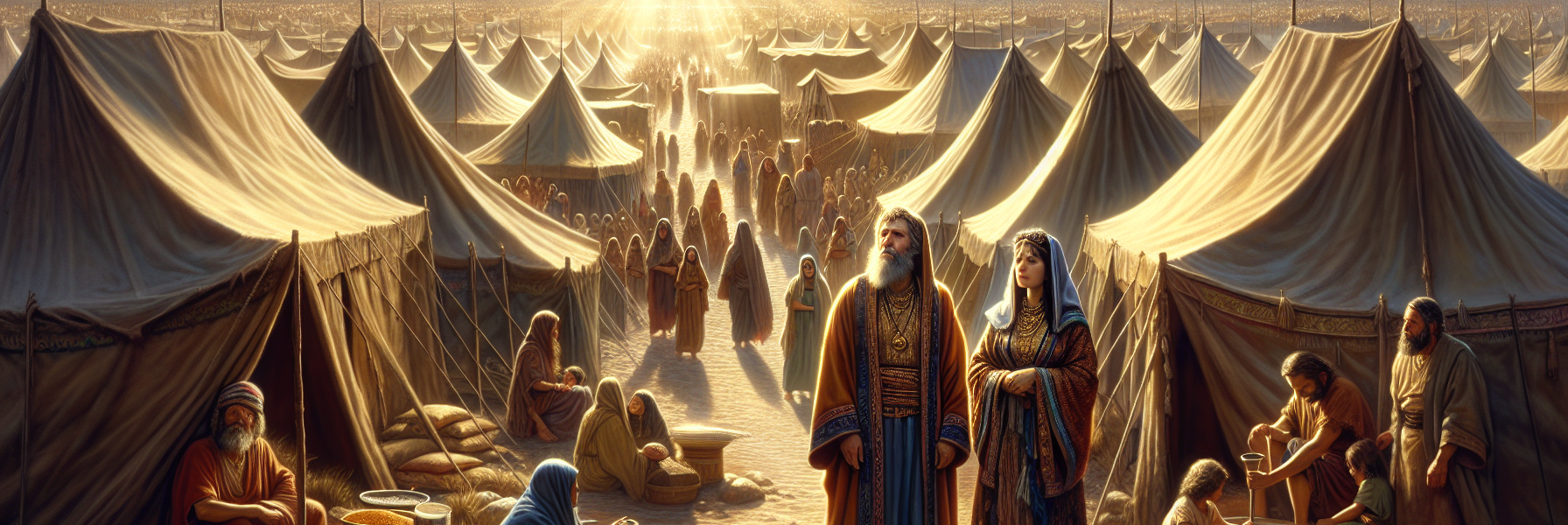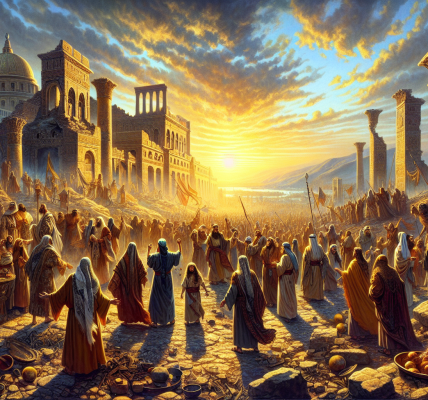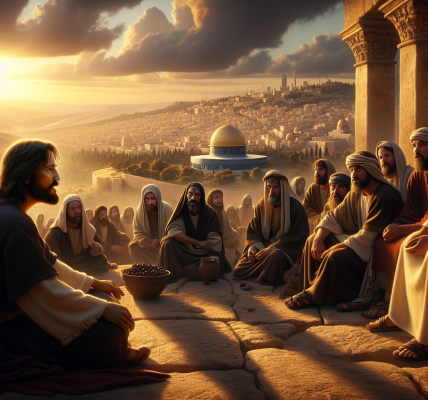**The Rebellion of Miriam and Aaron**
The sun blazed over the vast wilderness of Paran, its scorching rays beating down upon the tents of Israel. The camp was alive with the sounds of daily life—children laughing, women grinding grain, and men discussing the long journey ahead. Yet beneath the surface of this bustling community, a quiet murmur of discontent had begun to stir.
Miriam, the elder sister of Moses, stood outside her tent, her sharp eyes watching as a group of women approached her. She was a prophetess in her own right, respected among the people for her wisdom and leadership. Beside her stood Aaron, the high priest, his priestly garments glinting in the sunlight. Both of them had been faithful servants of the Lord, yet something had begun to fester in their hearts.
“Have you heard?” one of the women whispered. “Moses has taken a Cushite woman as his wife!”
Miriam’s lips tightened. The news had spread quickly—Moses, their brother, had married Zipporah, a woman from Midian, years ago. But now, it seemed, he had taken another wife, a woman from Cush. Whether this was a new marriage or simply a renewed focus on Zipporah (whose dark skin marked her as Cushite in their eyes), the people whispered, and Miriam and Aaron listened.
“It is not right,” Aaron murmured, stroking his beard. “Does the Lord speak only through Moses? Has He not also spoken through us?”
Miriam nodded, her voice rising with conviction. “Why should Moses alone be exalted? Are we not also chosen by God?”
Their words, once spoken in secret, soon spread like wildfire. The discontent grew, and the people began to question Moses’ authority. Unbeknownst to them, the Lord heard every word.
—
Then, suddenly, the presence of the Lord descended upon the Tabernacle. A thick cloud enveloped the sacred tent, and the air grew heavy with divine power. The camp fell silent, all eyes turning toward the Tabernacle in fearful anticipation.
Then the voice of the Lord thundered, calling Moses, Aaron, and Miriam to come forward. Trembling, the three siblings obeyed, standing before the entrance of the Tabernacle. The ground seemed to shake beneath them as the Lord spoke:
**”Hear now My words: If there is a prophet among you, I, the Lord, make Myself known to him in visions; I speak to him in dreams. Not so with My servant Moses; he is faithful in all My house. With him I speak face to face, clearly and not in riddles, and he beholds the form of the Lord. Why then were you not afraid to speak against My servant Moses?”**
The wrath in the voice of the Almighty was unmistakable. Aaron turned pale, his hands shaking. Miriam’s breath caught in her throat—she had not expected such a swift and terrifying rebuke.
Then, as suddenly as the cloud had appeared, it lifted. But as it did, Miriam gasped. Her skin, once healthy and vibrant, had turned white as snow—stricken with leprosy.
“Aaron!” she cried, her voice breaking. “Look what has happened to me!”
Aaron turned to Moses in desperation. “Oh, my lord, do not hold this sin against us! We have acted foolishly! Do not let her be like one dead, whose flesh is half consumed!”
Moses, though wounded by their betrayal, did not hesitate. He fell to his knees, crying out to the Lord, **”O God, please heal her!”**
The Lord’s response was firm but merciful. **”If her father had but spit in her face, would she not be shamed seven days? Let her be shut outside the camp seven days, and after that she may be brought in again.”**
So Miriam was led outside the camp, alone and disgraced. The people did not move forward until she was brought back after seven days, humbled and healed.
And the camp of Israel learned that day that to speak against the Lord’s chosen servant was to invite His judgment. Yet even in wrath, there was mercy—for the prayers of a righteous man availed much, and the Lord, though just, was ever compassionate to those who repented.
Thus, the journey continued, but the memory of Miriam’s rebellion lingered as a solemn warning to all who would question the wisdom of God.



